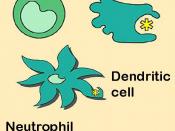Sounds So Good Although it has only been in recent times that scientists have started to document the effects of music, the qualities of music have been understood for centuries, even millenniums.
Evidence suggest that dance and song predated speech, making music the original language of humans. People throughout history have marvelled and questioned the mysterious effect of music on human psychology and physiology. Why do babies respond positively do there mother's lullabies? Why do children who are introduced to music at early ages do better in school? Science is in the process of answering these questions and more, but as one soon discovers an answer to one question often leads to many more questions.
As early as I can remember music as been an everyday aspect of life. In kindergarten teachers used songs in order to teach the ABC's and even in high school we learned songs to learn the capitals of Spanish speaking countries (Bogota, Columbia...
Do Do Do-de-Do Do Do). "Music is widely believed to have many benefits for children beyond those within the realm of music itself.
These benefits are thought to contribute importantly to development by improving intellectual, motor, and social abilities and skills (MuSICA 1)." It is apparent that there is a relationship between music and cognitive learning, and that relationship is both psychological and physiological. One psychologist states that a "mother's singing decreases stress hormones in her child (Discover 1)." The same research testifies to an experiment in which she tested infants ability to recognize scale progression, but specifically out of place notes on a typical Western musical scale. She noticed "At first, the baby seams indifferent. Then an anomalous note - one that doesn't belong in the scale - intrudes on the recording, and he suddenly turns his head toward the speaker. He'll do this repeatedly when the wrong note is played (Discover 2)." This points to the idea that humans are innately and biologically capable of recognizing and appreciating music.
"Educators have long observed the benefits of early musical training on school performance, and various studies have shown that some areas of the brain are enlarged among those whose 'perfect pitch' facility is revealed in that early training (Bargrean 2)." Other important studies have shown a strong link between musical education and reading abilities of first graders.
In the experiment the children "received Kodaly training, which uses folk songs and emphasis on melodic and rhythmic elements (MuSICA 1)." this was the experimental group. "The control group consisted of children who were matched in age, IQ and socioeconomic status (MuSICA 1)." After seven months "the music group exhibited significantly higher reading scores than did the control group (MuSICA 1)." The obvious reaction to this kind of experiment is to question whether or not is was the actual music training of merely the extensive out-of-school learning activity.
It seems that it would be both, but largely in favor of the actual music. Music being an abstract art, stimulates various regions of the brain. "The musicians in the study had relative grey-matter volume in five regions of the brain and pronounced differences in the cerebellum bilaterally (Bargrean 2)." Music is proven to be a invaluable aid to childhood cognitive development, but it is also proven to be a valuable psychological and physiological aid. In one particular experiment "a group of 10 people... beat hand drums for an hour while a music 'facilitator' conducted. Afterwards, Bittman took blood samples. the drummers, he found, had heightened levels of immune cells called natural killer cells that seek out and destroy both cancer cells and cells infected by viruses (Discover 3)." "Research has shown that "Music can also mitigate stress (Discover 3)." Reports of stroke patients who were unable to utter a single word, were able to begin singing after being exposed to music. The use of music to relax is universal. No research is really necessary to prove that people enjoy listening to music.
Music is almost as magical as it was when humans first began humming tunes and beating rocks together thousands of years ago.
Granted we might have to look harder these days for good music, it no doubt exist. Music has long been believed to be beneficial to humans, but how and why exactly are questions that are just now being answered. Science will eventually answer every single detail to the question behind music and whatever that entails, but right now the fact music just sounds so good and makes us happy is good enough.
Bargrean, Melinda. "Classical-music fans may have more brains." Seattletimes.com 12 Aug. 2001. 19 November 2002 .
Discover. August 2001. 19 November 2002 .
MuSICA. 1994. 19 Nov 2002 .








